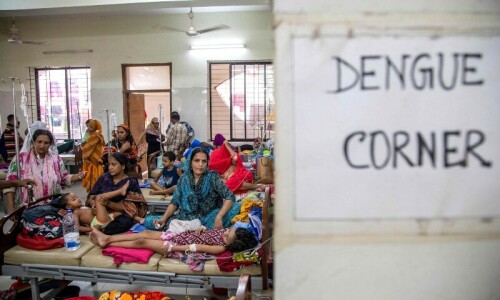THAT Pakistan's relations with the US have been complicated and episodic from the start is well known. Beyond this fact, answers to even basic questions regarding US assistance to Pakistan remain opaque. For starters, just what is the current quantum of non-military assistance?
A follow-up question: how important is US economic assistance to Pakistan anyways? Given the veiled hints from some quarters in the US of a possible rupture in ties in the wake of the 'Lahore incident', it will be useful to explore the broad contours of Pakistan's economic relationship with the US.
In terms of overall assistance, Pakistan has been a recipient of substantial inflows from the US in fits and starts over the years, with the bulk being in the realm of military aid. In terms of US economic assistance to Pakistan, the defining features since inception appear to have been:
— It has not been enduring, but spasmodic;
— The US has invariably followed a short-sighted, 'transactional' approach in its relationship with Pakistan, and continues to do so despite a strong case having been made at the start of the Pakistan-US strategic dialogue for a 'transformational' relationship (more on this later);
— Assistance has peaked in non-democratic set-ups;
— US aid has generally been pro-cyclical, reinforcing upturns in the economy, rather than supporting Pakistan's economy in a downturn (as currently);
— As a result, the impact has not been 'visible', since external inflows in economic upturns in Pakistan have given rise to wealth effects based on asset ownership — which, by definition, means the true beneficiaries are likely to have been the already affluent rather than the poor or vulnerable;
— US programmes are mired in bureaucracy, with large 'lags' and high transactional costs (to be fair, the latter is pretty much the case with all aid programmes across the board);
— Spending has, until now, either ignored areas deemed high-impact by the Pakistan side (agriculture, water, market access, for example) or, has been spread too thin over a large number of projects. As a result, the impact has been diffused, denying the US visibility for the taxpayer dollars it has spent in Pakistan. New York Times Wall Street Journal
In the current episode of engagement, the flagship assistance programme on the non-military side is under the aegis of the Kerry-Lugar-Berman Act (KLB). If the embedded wisdom of , CNN, et al is to be believed, the country receives $1.5bn a year in non-military assistance under 'KLB'. However, the fact is that Pakistan has received less than $750m two years on. Even for the current fiscal year, $600m has been budgeted under KLB — not $1.5bn.
One explanation for this anomaly held out by the US refers to concerns relating to non-transparent use of the money. With 'made in USA (and UK)' written all over the infamous NRO that brought Pakistan's 'transparency' issues into power in the first place, this is quite rich — in the same league as the 'we-have-been-busy-promoting-democracy-in-the-Middle East-for-the-past 30 years' narrative that is currently being weaved.
The most potent form of economic assistance the US can provide to Pakistan, one with the greatest externality, is allowing preferential market access to the country's textile and clothing (T&C) exports. If focused on the right products, such as garments (labour-intensive and value-added), the US intervention has the potential to create hundreds of thousands of additional direct and indirect jobs, carving a powerful urban, educated (and possibly currently unemployed) constituency comprising the country's youth. This will also be the 'lowest cost' in terms of US taxpayer dollars, since the additional exports from Pakistan will most likely displace existing imports into the US from some other producer.
Strangely, this is proving to be the second hardest legislation to bring to Congress after domestic gun control. Pursued actively by Pakistan since 2004, this request has routinely met the same response: Congress will not sacrifice the interest of North and South Carolina and other states with a large textiles constituency. Since then, however, Congress has allowed duty-free access for textiles and clothing to large regional blocs in Central America, the Andean states and a number of African countries. In addition, it has signed a number of Free Trade Agreements with countries in close proximity to Pakistan (such as Oman) which is hurting Pakistan's exports. On top of this, China and other large T&C producers have already made substantial inroads in the US market in the wake of the phasing out of the Multi-Fibre Agreement, making the protectionist argument redundant in any case.
Instead, Pakistan has been offered a bizarre piece of legislation — the Reconstruction Opportunity Zones (ROZs) initiative — which potentially provides for duty-free access for a limited number of small ticket lines that Pakistani exporters generally shun, with the additional proviso that the factories are located in conflict-affected areas such as Fata.
Moving beyond the ineffectiveness of US economic assistance, it is imperative to change the flawed narrative that Pakistan is a hapless, fragile economy that will collapse without foreign assistance. That job will get done by our failure to mobilise our own substantial domestic resources. This narrative emanates from ruling elites that benefit most from the status quo — a reliance on foreign inflows, without taxing themselves.
While it is true that Pakistan currently has a high degree of dependence on foreign savings, this can be mitigated to a large extent by correct policies. Pakistan is a richly-endowed country, but like most of its other resources, the country is not utilising its vast financial resources too. This is as good a time as any for Pakistan to wean itself from the aid dependency syndrome that has been cultivated.
The writer was until recently the principal economic adviser to the Ministry of Finance.











































Dear visitor, the comments section is undergoing an overhaul and will return soon.